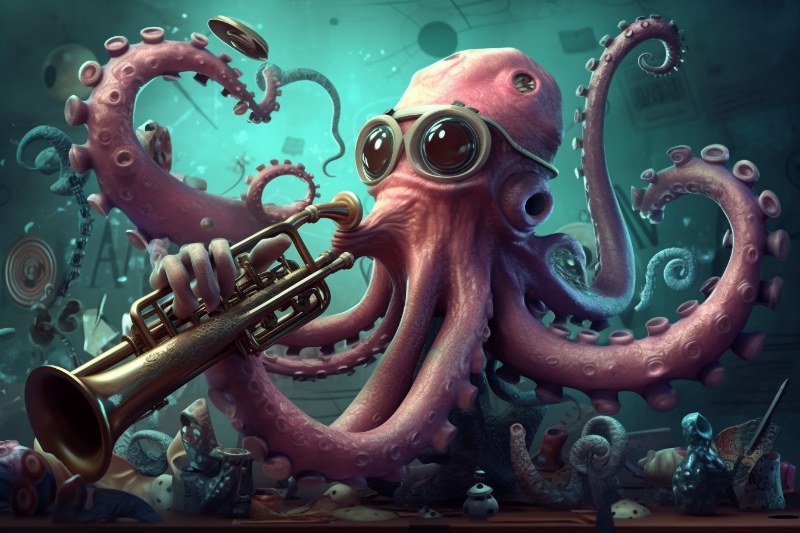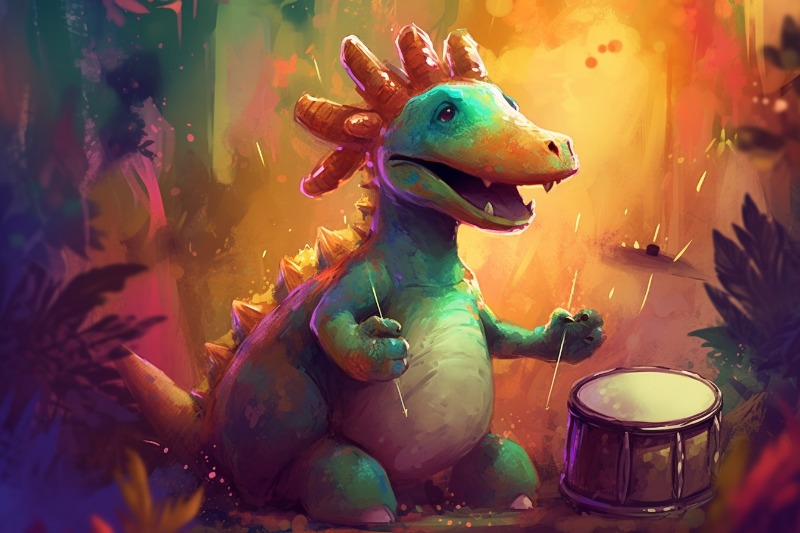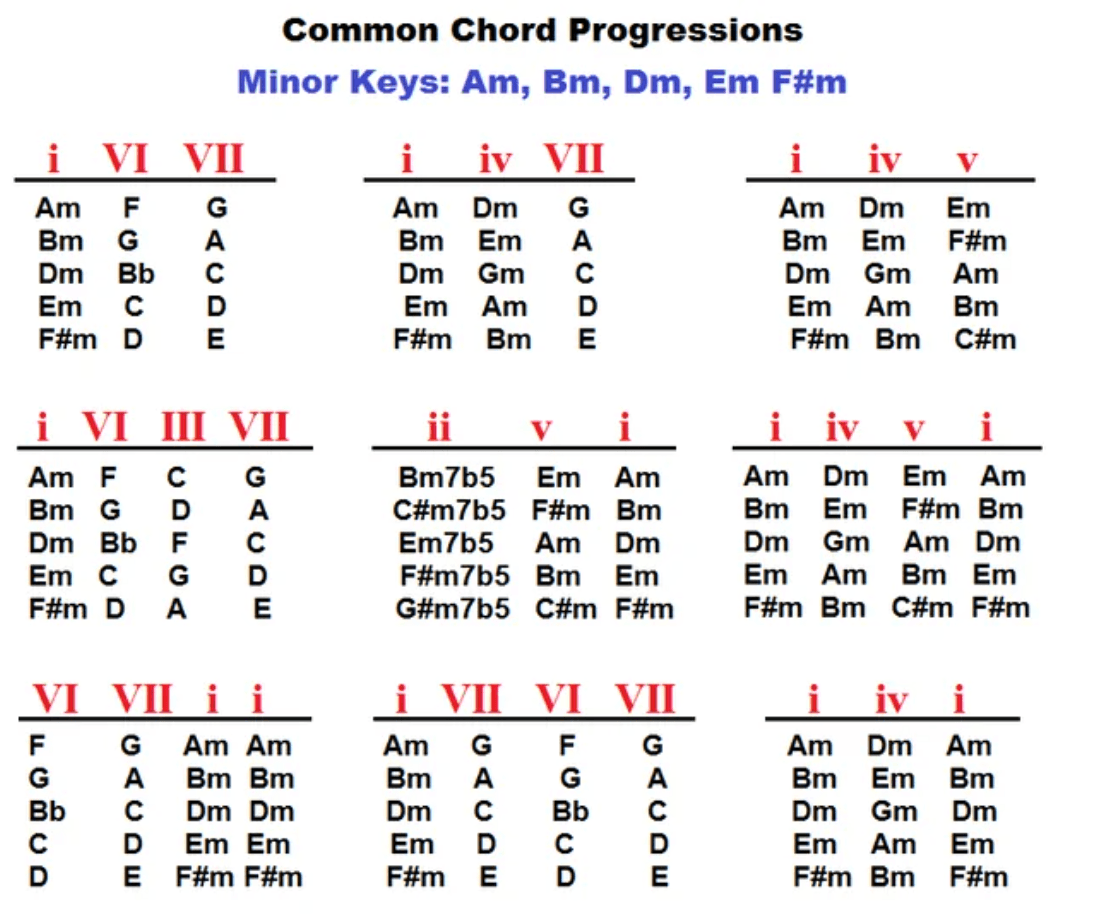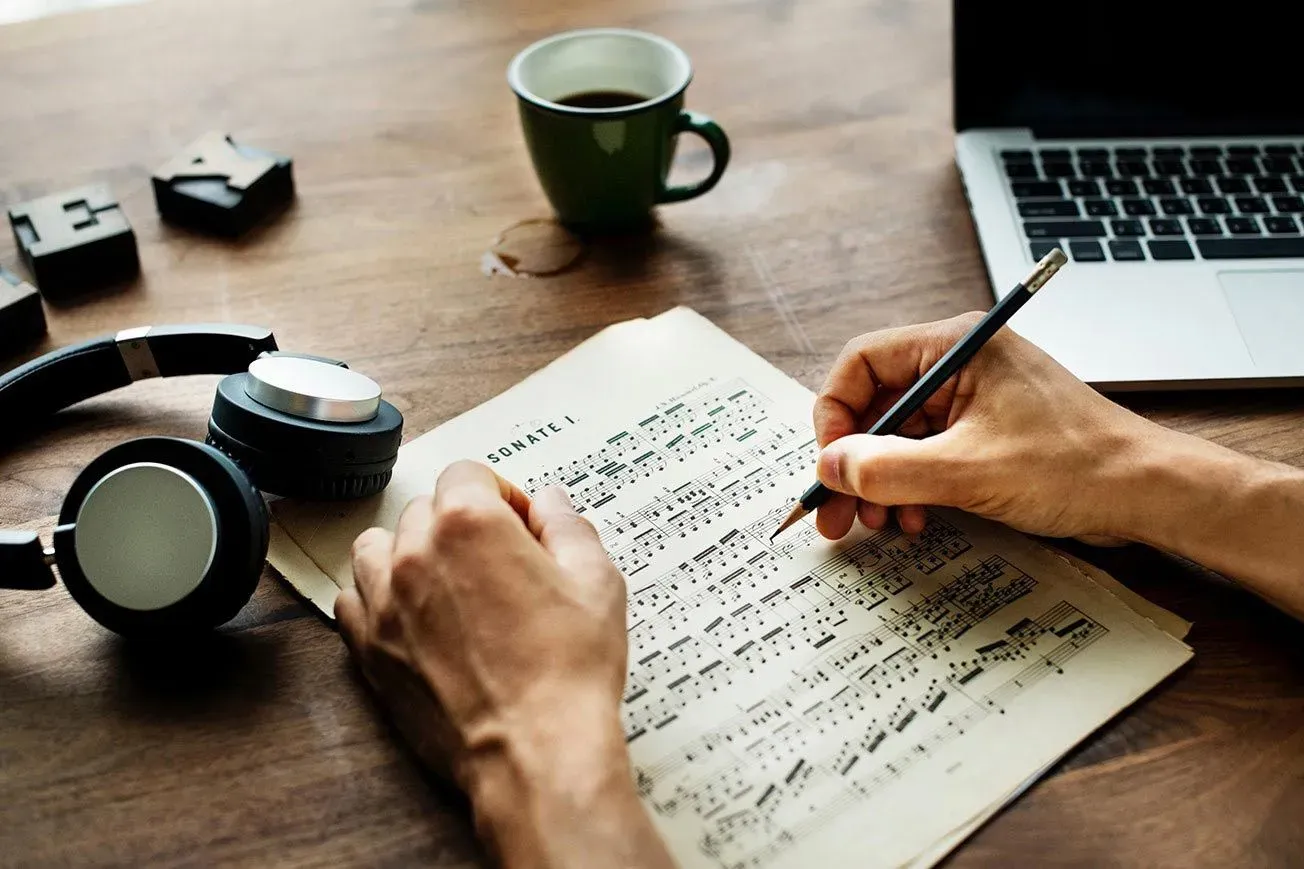In a world where AI music generators are reshaping the audio AI tool landscape, 2023 has emerged as a pivotal year.
Let's explore how these tools are enhancing the creative process, making audio production more accessible and innovative than ever before.

Trends in AI Music Industry
The AI music industry is witnessing a significant transformation in music production and composition. AI algorithms are being utilized to analyze vast datasets of musical genres, aiding in the creation of innovative and compelling compositions.
For example, Aiva, an AI composer, has shown its ability to compose orchestral pieces, offering a glimpse into the future of AI in music creation. Similarly, tools like Google’s Magenta Studio help musicians generate unique melodies and rhythms, pushing them to explore new creative boundaries.
This integration of AI is not just about generating sounds but offering fresh perspectives and encouraging artists to venture into uncharted territories of music creation.
Examples of Artists Leveraging AI for Music Creation
Artists are increasingly embracing AI as a collaborator in their creative process. Pop artist Taryn Southern used AI to compose the track “Break Free,” feeding lyrics and themes to an AI algorithm for creative input.
German composer Holly Herndon collaborated with an AI named Spawn to co-create the album “PROTO,” showcasing an evolving role of AI in musical expression.
The Impact of GenAI on Music Creation: Driving Inspiration and Saving Time
Generative AI (genAI) tools are empowering artists to generate audiovisual content quickly, transforming inspiration into full compositions.
These tools are helping artists overcome creative blocks and push their creative boundaries.
GenAI is also streamlining music production processes like mixing, allowing artists to focus more on creativity than technicalities.
GenAI and Copyrights
The rise of genAI in music raises critical questions about copyright protection and the legality of AI-generated works.
There are concerns about whether AI-generated music that mimics famous artists violates copyright law and how AI-generated voices can be regulated.
This area is currently lacking sufficient regulations and is expected to evolve as AI-generated content becomes more prevalent.
The Impact of GenAI on Music Distribution and Consumption: Decentralization and Personalization
GenAI is potentially leading to decentralization in the music industry, offering opportunities for local and niche musicians.
AI-powered platforms are enabling direct distribution to streaming platforms, allowing artists to retain more royalties.
In terms of music consumption, genAI enhances personalization in streaming services, offering curated playlists and immersive experiences to listeners.
AI is also enabling feedback loops between artists and consumers, fostering closer artist-fan relationships (Miquido Blog, 2023).
AI in Event Industry Ticketing: Revolutionizing Event Ticketing
AI is revolutionizing event ticketing by combating fraud and introducing generative possibilities for an improved fan experience.
It's enhancing security measures against fraudulent transactions and introducing AI-driven ticket prioritization, boosting productivity in the ticketing process.
This integration of AI in event ticketing is streamlining sales and financials, and enhancing the overall event experience.
Discovering the Next Best: Top 3 AI Music Generators
The AI music industry is evolving rapidly with groundbreaking tools that redefine the music creation process. In this exploration, we delve into the top 3 AI music generators that stand out in 2023.
These generators are not just tools; they represent a new era in music production, offering unique features that cater to both amateur and professional musicians.
Each of these generators demonstrates the potential of AI to enhance creativity and streamline the music-making process.
Let's discover what makes each of these AI music generators a go-to choice for modern musical innovation.
1. Empress AI: Harnessing AI for Musical Innovation
Empress AI provides an innovative platform in the AI music industry, designed to facilitate a creative and efficient music production process.
It offers a diverse range of AI-driven tools that cater to various musical genres and styles.
These user-friendly tools are crafted to enhance creativity, allowing songwriters, producers, and musicians to explore new musical dimensions.
Empress AI simplifies complex tasks like melody creation, lyric writing, and rhythm programming, making it a valuable asset for both novice and experienced artists in their musical endeavors.
a. Melody Mind
Melody Mind is an innovative AI melody generator. Users can input their desired instrument, chords, genre, and BPM to begin the creative process.
For instance, choosing a piano, F major chords, a classical genre, and a tempo of 60 BPM could result in a serene, melodious composition.
This tool is particularly useful for experimenting with different musical styles and discovering new melodic possibilities.
b. Lyric Lab
Lyric Lab is an AI-driven lyric generator, where users specify a genre and a tone or style to create lyrics.
Selecting a genre like rock and a passionate style could produce powerful and emotive lyrics.
This tool aids songwriters in exploring thematic content and stylistic nuances, enhancing their lyrical creativity.
c. Chord Candy
Chord Candy is an AI chord generator that takes inputs like instrument, key, genre, and BPM to craft chord progressions.
Inputting a guitar, D minor, blues genre, and 80 BPM, for example, could generate a soulful and expressive chord sequence.
It's ideal for musicians looking to explore new harmonic landscapes.
d. Song Idea Generator
The Song Idea Generator assists in developing song themes or emotions. Inputting a feeling like 'nostalgia' might inspire a reflective and poignant song concept.
This tool is perfect for artists seeking thematic inspiration and wanting to convey specific emotional narratives in their music.
e. Bass Brain
Bass Brain focuses on generating bass lines. Musicians input the type of bass, chords, genre, and BPM.
For example, a synth bass with E major chords in an EDM genre at 128 BPM could produce a dynamic, dance-inducing bassline.
It's great for bassists and producers looking to add depth to their tracks.
f. Drums De Dior
Drums De Dior generates drum beats based on the selected genre and BPM. Opting for an R&B genre at 90 BPM might result in a smooth, rhythmic drum pattern.
This tool is essential for drummers and producers aiming to create the perfect beat for their music style.
g. Harmonious Hitmaker
Harmonious Hitmaker transforms song titles into potential hits using inputted emotions and genres.
A title with 'Excitement' in a pop genre might evolve into an energetic and catchy tune.
This tool is beneficial for artists brainstorming title ideas that resonate with their intended emotional impact and genre style.
2. Soundraw: Versatile AI Music Generation for Creative Exploration
Soundraw is an AI music generator known for its extensive customization capabilities. It allows users to choose various elements such as song tempo, mood, genre, theme, and instruments.
The tool's standout feature is its ability to create up to five-minute long songs even on its free tier.
Soundraw also offers detailed editing options, enabling users to tweak different parts of a song to adjust its energy and style.
For those looking to monetize their creations, Soundraw provides a paid personal plan. This generator is ideal for users seeking a wide variety of customizable AI-generated music options. For more information.
Features:
- Variety in Music Creation: Soundraw allows users to choose the song’s tempo, mood, genre, theme, and instruments, offering a wide array of options for customization.
- Song Customization: Users can customize their song variations, adjusting energy levels and trending parts of the song up or down according to their needs.
- Pro Mode Editing: Soundraw includes a Pro mode that allows more detailed editing, such as tinkering with instruments and their elements.
- Song Length Flexibility: Unlike some other AI music generators, Soundraw enables users to generate songs up to five minutes in length, even in the free tier.
- Monetization Options: For monetization purposes, Soundraw offers a personal plan, which allows users to use the generated songs for various platforms including social media, web ads, and more.
- User-Friendly Interface: The tool is designed to be intuitive and accessible, making it suitable for both beginners and experienced music creators.
3. AIVA: Elevating Music Creation with AI Diversity and Quality
AIVA is an AI music generator that stands out in 2023 for its ability to create diverse and high-quality music compositions.
Utilizing a variety of generation profiles that encompass genres like Lo-fi, techno, and meditation, AIVA offers a rich dataset from which it evolves new music.
Users can select key signatures, durations, and the number of compositions, after which AIVA produces the music. The tool also allows for fine editing of elements like tempo and melody.
The free version permits songs up to three minutes, while the paid plan extends these capabilities. AIVA is noted for its adaptability and quality in AI-generated music across various styles.
Features:
- Generation Profiles: AIVA uses pre-created datasets or generation profiles of music that contain sample tracks. These profiles cover a range of genres, including Lo-fi, techno, meditation, afro house, and more.
- Customization Options: Users have the ability to choose key signatures containing all scale notes, select the duration of the composition, and decide on the number of compositions to generate.
- Editing Capabilities: AIVA offers options for fine editing elements such as tempo, melody, chords, bass, and percussion, allowing users to tailor the AI-generated music to their preferences.
- Rapid Output: The AI music generator produces an output quickly, often within a minute, depending on the user's chosen style.
- Subscription Plans: AIVA offers a free tier that allows a maximum song output of up to three minutes without monetization. There is also a standard paid plan that extends song lengths to up to five minutes and includes limited monetization options.

Exploring Other Music Trends in 2023
Apart from AI advancements, 2023 has witnessed several other trends shaping the music industry.
These trends range from shifts in genre popularity to innovations in live performances and recording techniques.
Understanding these trends is crucial for artists and producers aiming to stay relevant in a constantly evolving landscape.
1. Sped-up Music and TikTok's Influence
The phenomenon of sped-up music, gaining traction on TikTok, is reshaping artists' approaches to music production.
Influenced by the platform's rapid-fire content style, this trend is prompting musicians to reissue their songs at increased tempos to cater to the app's dynamic and youthful audience.
The impact extends beyond audio, influencing the pace and energy of visual content on social media.
This high-tempo trend is leading to a new aesthetic in both music and video content, appealing particularly to Gen Z and creating a vibrant, high-energy online atmosphere.
2. Rise of Micro-Genres
In 2023, the music landscape is becoming increasingly rich with the emergence of micro-genres such as synthwave, drift phonk, amapiano, slowcore, and Eurodance.
These genres, often deeply rooted in specific cultural or online communities, are gaining popularity and bringing a fresh diversity to the musical spectrum.
This trend is a testament to the evolving nature of music consumption and creation, where niche genres are finding mainstream appeal and broadening the musical tastes of audiences worldwide. The rise of micro-genres signifies a shift towards more eclectic and varied musical expressions in the modern era.
3. Collaborations and Cross-Promotions
Collaborations and cross-promotions are becoming increasingly common and pivotal in the music industry.
Artists are transcending traditional genre boundaries and cultural differences to create unique and innovative music.
These joint endeavors allow musicians to expand their reach to new listeners, share artistic resources, and delve into diverse musical genres and concepts. Engaging with artists from varied backgrounds enriches the music, extending the creative scope of the artists involved.
Such collaborations contribute to a vibrant and interconnected musical environment, fostering innovation and a diverse range of musical expressions.
This trend reflects the growing importance of networking and partnership in today's music industry, driving creativity and audience engagement.
4. Focus on Mental Health
In 2023, the music industry is intensifying its focus on mental health, acknowledging the challenges and pressures that artists face. This shift involves a greater emphasis on mental well-being, encouraging artists to prioritize self-care and professional mental health support.
This growing awareness is leading to the development of more support systems and resources within the industry.
The approach is towards fostering an environment where artists can thrive creatively without compromising their mental health, ensuring sustainability in their careers. This change reflects a more holistic view of artists as individuals, valuing their well-being alongside their creative output.
5. The Power of Playlisting
Playlisting has become a crucial element for artists looking to increase their visibility and streaming numbers in 2023. Being featured on popular playlists on platforms like Spotify and Apple Music can significantly amplify an artist's reach and exposure.
This trend highlights the growing influence of digital streaming services in shaping music consumption patterns. Artists are now focusing on networking with playlist curators and creating high-quality content that aligns with the themes and moods of these playlists.
This strategy is becoming an essential part of music marketing, helping artists connect with wider audiences and boost their digital presence.
6. Growing Importance of Data and Analytics
In the music industry of 2023, data and analytics are playing an increasingly pivotal role.
Artists are utilizing these tools to gain deeper insights into their audience's preferences, track their performance across various platforms, and refine their marketing strategies accordingly.
This emphasis on a data-driven approach is essential for artists looking to grow their fanbase and enhance their streaming numbers.
By analyzing listener demographics, geographical distribution, and engagement metrics, artists can make informed decisions, tailor their content to audience preferences, and optimize their promotional efforts, thereby boosting their reach and relevance in a competitive digital landscape.
Also: Read more about AI in Music Marketing: A Glimpse into 2023
7. Tipping as a Monetization Method
Tipping is gaining prominence as a key monetization method in the music industry, particularly on live streaming platforms and social media.
This trend underscores a shift towards more direct and personal fan-artist interactions.
Fans can now show their support and appreciation by tipping artists during live performances or when engaging with content on platforms such as YouTube, Twitch, Instagram, and TikTok.
This method of monetization not only provides an additional revenue stream for artists but also fosters a stronger connection between artists and their audience, enabling fans to actively contribute to their favorite artists' success.
8. Classical Music's Resurgence
Classical music is witnessing a significant resurgence, especially in the realm of online content. Its enduring appeal and timeless quality are being rediscovered, making it one of the fastest-growing genres in the digital media space.
This resurgence is likely driven by a renewed interest in the rich emotional depth and complexity that classical music offers.
Content creators are increasingly incorporating classical music into their projects, leveraging its dramatic and emotive power to enhance the storytelling and emotional impact of their work.
This trend reflects a broader appreciation for the genre's historical significance and artistic value in contemporary settings.
Empress: Your Partner in Musical Journey
Empress is more than just an AI music tool; it's a companion for your musical journey. Whether you're a seasoned musician or a budding artist, Empress provides the resources you need to bring your auditory vision to life.
FAQs: AI Music Generators
Q1: How do AI music tools enhance the creative process?
AI music tools streamline the creative process by automating complex tasks like melody generation and chord progression, allowing artists to focus more on creativity and experimentation.
Q2: Can beginners use AI music generators effectively?
Yes, beginners can effectively use AI music generators as they typically offer user-friendly interfaces and intuitive controls, making music creation accessible to those without extensive musical training.
Q3: Are AI-generated compositions unique?
AI-generated compositions are unique as they are created based on algorithms that can produce a wide variety of musical elements and styles, although the level of uniqueness can vary depending on the tool's capabilities.
Q4: How does Empress assist in music marketing?
Empress assists in music marketing by providing AI tools that generate SEO tags, YouTube descriptions, and social media captions, helping artists enhance their online presence and reach wider audiences.
Q5: What sets Empress apart from other AI music tools?
Empress stands apart due to its comprehensive suite of tools for both music creation (like melody and lyric generation) and marketing assistance, catering to a holistic approach for artists.
Follow the future of music with Empress. Check out our blog to learn how you can effectively use these AI music tools.


